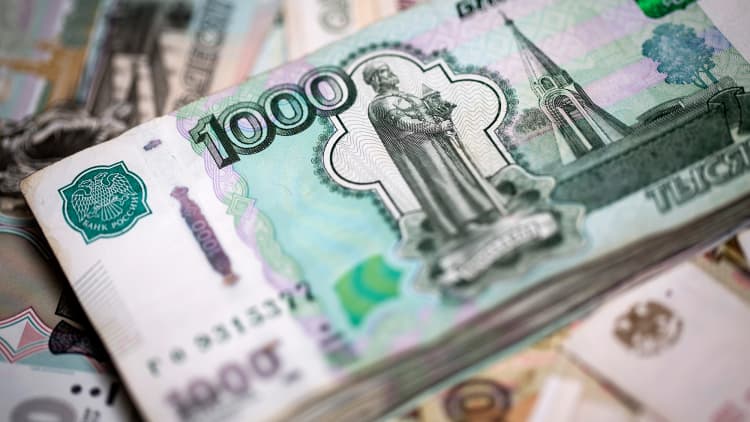Russia's currency briefly surpassed the Ukrainian Hryvnia as the world's worst performing currency year-to-date this week, but it isn't clear whether the ruble is undervalued.
The ruble weakened to 80 per U.S. dollar on Tuesday despite the Central Bank of Russia's effort to shore up the embattled currency with a 650 basis-point rate hike to 17 percent early that morning, briefly making it the world's worst-performing currency.
Declining oil prices coupled with a series of Western sanctions on Russia over its activities in Ukraine have dogged the currency. The ruble is strongly correlated with the price of oil, Russia's most important export, which accounted for 14 percent of gross domestic product in 2012, according to World Bank data. Brent crude oil has fallen from above $115 per barrel in mid-June to around $59.42 a barrel in Asian trade Friday.
Russia's Finance Ministry said on Wednesday it was starting to sell its leftover foreign-currency stock and that it considered the ruble to be "extremely undervalued." The ruble has since strengthened, with the dollar fetching around 61.60 rubles on Friday.
Undervalued?
But not everyone believes the decline is overdone.
"We are not convinced by the Russian finance ministry's claim… on Wednesday morning that the ruble is 'extremely undervalued.' After all, Russia has undergone an enormous deterioration in its terms of trade as a consequence of the slide in the price oil, which seems unlikely to unwind any time soon," Capital Economics wrote in a note on Wednesday.
While Capital Economics notes the Finance Ministry's claim was made when the ruble was above 70 per dollar and that it has since strengthened to around 60 per dollar, it believes Russian authorities "would continue to assert that the ruble was mispriced."
Read More Russia's ruble rout: Why it shouldn't surprise you
"The devastating consequences that the current oil price will have on Russia's economy and its financial system suggest calm may not be restored any time soon, keeping the ruble under pressure," it said.
However, it does not rule out a further recovery in the ruble if oil prices rebound or if Russian authorities take further supportive measures.
Others also think Russia's central bank isn't offering the best call on the value of the ruble.
While oil is one of the main triggers of the ruble sell-off, it's not solely responsible, Mizuho Bank said in a note on Wednesday, suggesting ruble weakness is justified.

"[The] sell-off is not solely from oil. Rather, [the ruble] tumble is exacerbated by, and predicated on, geo-politics as well as doubts about consequent ability and willingness to meet external debt," it said.
"If [the] sanction impact worsens (acting via real or financial channels) or from a further and sharp tumble in oil prices, it could tip the [ruble] into a 1998-style crisis," it added, referring to the financial crisis in Russia that saw the ruble plummet and the country default on its debt.
Not so fast
But some think the currency could be at a turning point.
It's a very difficult time to jump into Russia given the tremendous correlations with oil prices, but if you think that oil is going to go sideways from here, you can buy, Tim Seymour, CIO at Triogem Asset Management told CNBC.
"I think the ruble will probably trade within a 55-60 band – that's appropriate," Seymour said. "Remember when we got near 75 and touched almost 80, that was implying Russia's version of crude trading somewhere around $25 per barrel. If that's where you think it's going, that's where the ruble will go. But I think the ruble should be 55 to 60 in a $65 Brent environment." Investors typically monitor Brent crude oil to price Russia's export blend.
Seymour believes that soft capital controls - roadblocks put in place by a government to restrict the flow of money out of or into its country- are likely, which will pressure the multinationals and the oil exporters who are selling in dollars to convert to rubles.
"To the extent that the central bank still has a lot of firepower, I think Russia is not going to default anytime soon," he added. "Russia is probably better off than people think."


